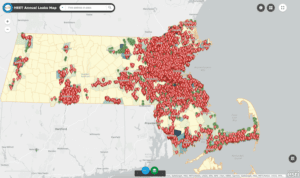Who is a member?
Our members are the local governments of Massachusetts and their elected and appointed leadership.

A map of gas leaks across Massachusetts, updated annually, is maintained by HEET.
Massachusetts has one of the oldest natural gas systems in the country, with about 22% of the pipes under the ground considered “leakprone” in 2020, according to HEET, a Cambridge-based nonprofit dedicated to cutting emissions.
In 2014, Massachusetts created the Gas System Enhancement Program to hold the six investor-owned natural gas distribution companies responsible for reducing gas leaks by accelerating the replacement of leaking infrastructure by 2039. The program and other statutes require gas distribution companies to ensure that leak-prone iron and steel pipes and services are replaced with new pipes.
Now, the public can view the location and estimated cost of each new planned gas pipe replacement project using pipe replacement maps created by HEET. Also available is HEET’s annually updated map of gas leaks across Massachusetts, along with estimated emissions.
Last year, 11,624 new gas leaks across Massachusetts emitted nearly 7,000 metric tons of methane — equal to an estimated 600,000 metric tons of carbon dioxide, or $7 million in wasted dollars, according to HEET. The largest 7% of gas leaks emit half of all the gas leaking from pipes, and major gas utilities and climate advocates have collaborated to develop a method to find and fix these big leaks.
Massachusetts enacted its Shared Action Plan as state regulation in 2019, and HEET has provided independent guidance and verification of this work. HEET’s analysis shows that the Shared Action Plan is on track to cut emissions from distribution gas pipes in half.
The state’s new Massachusetts Clean Energy and Climate Plan for 2025 and 2030 recognizes that long-term climate policies will affect the future of greenhouse gas emissions, and measures to reduce natural gas combustion for heating buildings and water would reduce methane emissions. Even “targeted decommissioning” of gas distribution systems may be needed to help the state transition to greater electrification.
The Gas System Enhancement Program is scheduled for review in 2024 under the Clean Energy Climate Plan. Among other issues, the process will evaluate safe alternatives to full line replacements in areas with low anticipated natural gas use.